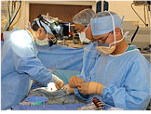


Disclaimer Privacy Policy
Copyright (c) 2021 Bicuspid Aortic Foundation, All Rights Reserved


Creating a Climate of Hope, an Atmosphere of Caring, and Information for All

Advancements
Life-Saving
Treatment
Currently, there is no "cure" for thoracic aortic disease once there is degeneration of the tissue. Once present, regardless of the underlying cause, medical and surgical treatment options are available. Aortic surgery has advanced significantly, over a period of about three decades, saving many lives. Visit the Treatment section for more information.
Thoracic Aortic Disease (TAD) - Surgery
When Should I Have Surgery?
One of the first questions faced by anyone with a thoracic aortic aneurysm is, "When should
I have surgery?"
The decision to have aortic surgery is carefully made, considering risk factors for that
individual, including their overall health and ability to tolerate surgery. Generally, surgery is
suggested when the risk of aortic tear or rupture is greater than the risk of having surgery.
Following are several things an aortic surgeon will consider regarding the timing of surgery:
•
Size of aneurysm
•
Aneurysm growth rate
•
Type of aortic disease present
•
Whether or not there are aortic symptoms such as chest or back pain
•
Family history (whether or not the aorta dissected or ruptured at small aortic sizes
in other family members)
•
Underlying reason for aneurysm, if known (syndromes, familial TAD, etc.)
A great deal of attention is paid to the size of the aorta, because as the aorta gets larger, the
odds are greater that it will tear or rupture. A great deal of attention is also paid to the risk of
having surgery. The most experienced aortic surgery centers have successfully lowered the
risk of aortic surgery. In these experienced centers, it should be possible to have surgery
done sooner, at smaller sizes, before the aorta tears or ruptures.
The aortic aneurysm size at which surgery is suggested varies somewhat between surgeons
and centers. When thinking about having thoracic aortic surgery, it is important to keep in
mind that:
•
Surgery should be done in an experienced aortic surgery center with a low rate of
complications and death and good long-term results.
•
Surgery decisions are made based on several factors, not just size alone.
•
Surgery decisions are made on an individual basis.
•
Surgery is generally offered to those with the most fragile aortic tissue earlier, at a
smaller aneurysm size, due to a greater risk of rupture or dissection.


- Aorta
- BAV and Other Heart Valves
- Blood Pressure
- Exercise/Weight Lifting
- Featured Papers
- Guidelines
- Familial TAAD
- History
- Honoring Dr. M.E. Abbott
- Pictures (graphic content)
- Pictures Valvular Strand, Aneurysm (graphic)
- Prosthetic Heart Valves
- Scientific Awards
- Spotlight on Research - Coming Soon
- Video (graphic content)
































